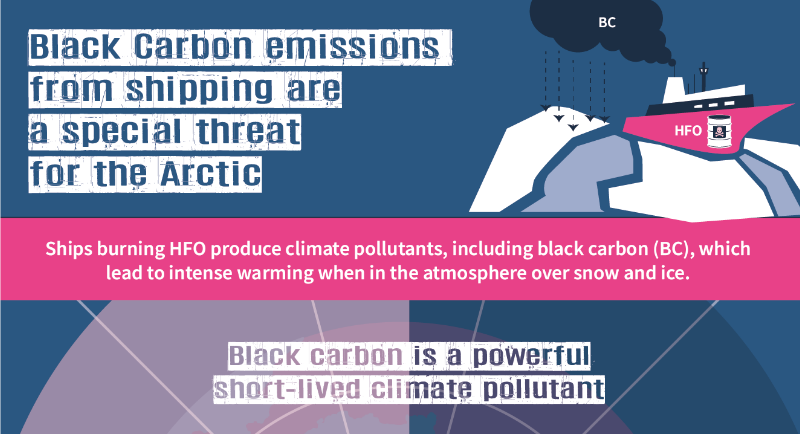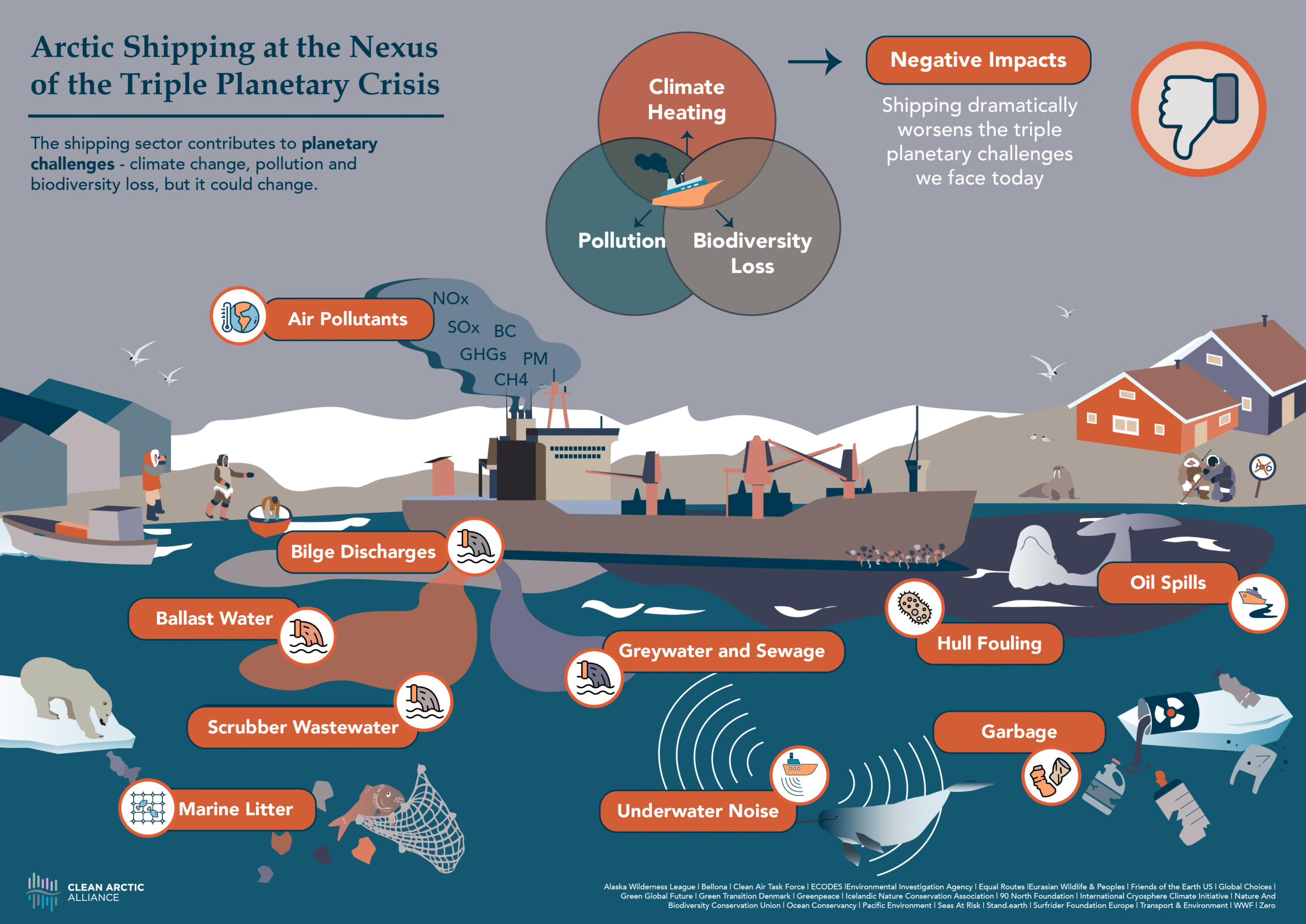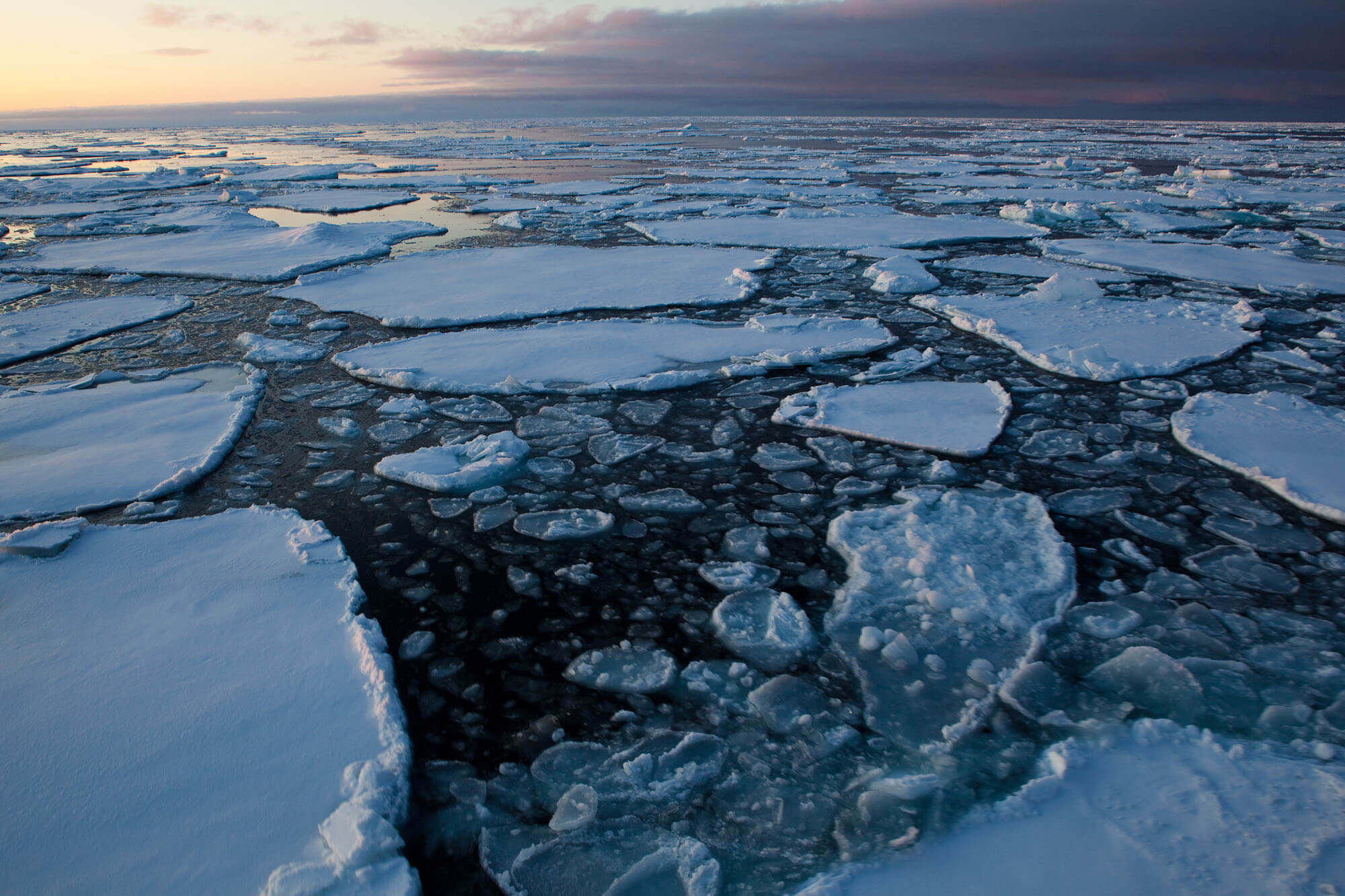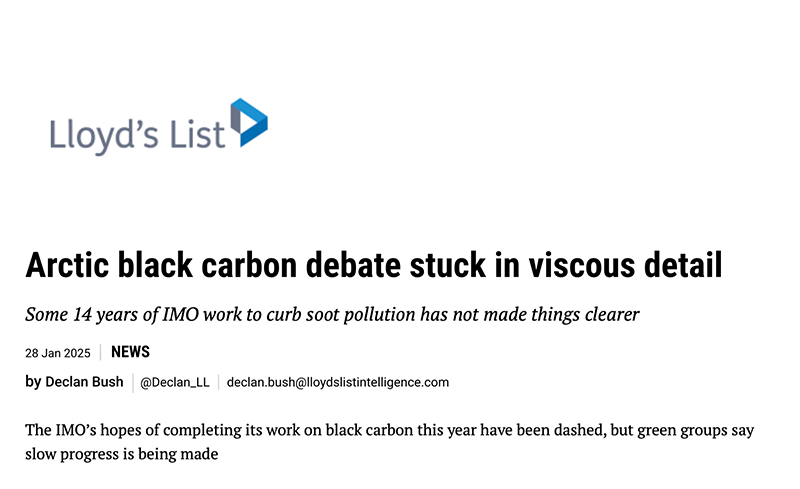London, 22 November 2021:- As a meeting of the International Maritime Organization (IMO) Marine Environment Protection Committee (MEPC 77) opens today in London, the Clean Arctic Alliance called on the IMO, its member states and international shipping to protect the Arctic by implementing a rapid decrease in emissions of black carbon from shipping in, or close to the Arctic, and to urgently reduce greenhouse gas emissions and black carbon emissions from the global shipping industry.
Black carbon is a short-lived climate forcer responsible for 20% of shipping climate impact (on a 20 year basis). When black carbon settles onto snow and ice, melting accelerates, and the loss of reflectivity creates a feedback loop exacerbating global heating. Black carbon emissions from shipping in the Arctic increased 85% between 2015 and 2019.
“This week, the IMO must tackle the impact of black carbon emissions on the Arctic, by urgently putting in place strong measures to drive rapid, deep cuts to black carbon emissions from shipping operating in or near the Arctic, and to urgently reduce CO2 and black carbon emissions from the maritime sector globally”, said Dr Sian Prior, Lead Advisor to the Clean Arctic Alliance.
“The Clean Arctic Alliance supports the proposal for a resolution submitted to MEPC 77 by eleven IMO Member States that calls on ships operating in and near the Arctic to move from heavier, more polluting fuel oils to lighter distillate fuels with low aromaticity or other cleaner alternative fuels or methods of propulsion”, she added [1]. “If all shipping currently using heavy fuel oils while in the Arctic were to switch to distillate fuel, there would be an immediate reduction of around 44% in black carbon emissions from these ships. If particulate filters were installed on board these vessels, black carbon emissions could be reduced by over 90%”.
“Recent IPCC findings show that the levels of climate ambition and timelines currently on the table for shipping at the IMO are totally inadequate”, continued Prior [2]. “It is imperative that measures due for adoption at the IMO’s Marine Environment Protection Committee (MEPC 77) be strengthened to ensure they drive fast deep cuts in both CO2 and black carbon emissions from ships, especially those visiting or operating near the Arctic.”
NGO Statement:
On November 18, NGOs called on the IMO to halve shipping’s greenhouse gas emissions by 2030, and for IMO member states to urgently align the agency’s work on reducing climate impacts from shipping with the COP26 developments during MEPC 77 [3].
The statement called on IMO member states to:
- Align shipping with the 1.5° degrees target: commit to reducing ship climate impacts on a timeframe consistent with keeping warming below 1.5°, including reaching zero by 2050 at the latest and halving emissions by 2030;
- Bolster short-term measures: reopen discussions on the level of ambition in the IMO’s short-term measure with a view to agreeing new targets consistent with halving emissions by 2030;
- Tackle black carbon: take decisive action to address the impact on the Arctic of black carbon emissions, a short-lived climate forcer responsible for 20% of shipping climate impact; and
- Set a GHG levy: agree a minimum $100/tonne levy on GHG emissions to raise climate finance and support a just transition to zero across the sector as called for at COP26.
ENDS
Contacts:
Dave Walsh, Clean Arctic Alliance Communications Advisor [email protected] +34 691 826 764
Notes:
[1] MEPC 77-9 – Comments on the outcome of PPR 8
[2] IPCC Report on Climate Crisis: Clean Arctic Alliance Calls for Black Carbon Cuts from Shipping
[3] NGO Statement: IMO must tackle impact of black carbon emissions on Arctic
About the Arctic and Black Carbon
Major shifts in climate occur more strongly and proceed faster at high latitudes with the most dramatic changes seen in the sea-ice cover of the Arctic Ocean. The summer sea ice cover is much reduced compared to only a few decades ago, and the remaining ice is about half as thick. Multi-year ice has declined by around 90%. Days with no summer sea ice could come as soon as the early 2030s, if the world fails to fulfil the Paris Climate Agreement’s commitment to limit global heating to less than 1.5C, which could have unprecedented consequences for the global climate and marine environment.
Arctic shipping is increasing as reduced sea ice opens up access to resources, and interest in shorter trans-Arctic shipping routes grows. Despite global efforts, ships’ black carbon emissions are rising – black carbon emissions from shipping in the Arctic increased 85% between 2015 and 2019. When black carbon settles onto snow and ice, melting accelerates, and the loss of reflectivity creates a feedback loop exacerbating global heating. Black Carbon also has health impacts for Arctic communities. Reductions in black carbon emissions from shipping in or near the Arctic can be introduced rapidly by switching to cleaner fuels and have an immediate impact in reducing melting of snow and ice since the black carbon is short-lived and remains in the atmosphere for only days or weeks.
For more information, see the follow infographics:

How Black Carbon Emissions from Shipping Impact The Arctic
https://cleanarctic.org/2021/03/08/black-carbon-facts/
Infographic: Urgent and immediate action needed to cut black carbon emissions from ships
Video: https://www.youtube.com/watch?v=soLKYlOm-pg
About the Clean Arctic Alliance
Made up of 21 not-for-profit organisations, the Clean Arctic Alliance campaigns to persuade governments to take action to protect the Arctic, its wildlife and its people.
Members include: 90 North Unit, The Altai Project, Alaska Wilderness League, Bellona, Clean Air Task Force, Green Transition Denmark, Ecology and Development Foundation ECODES, Environmental Investigation Agency, Friends of the Earth US, Global Choices, Greenpeace, Iceland Nature Conservation Association, International Cryosphere Climate Initiative, Nature And Biodiversity Conservation Union, Ocean Conservancy, Pacific Environment, Seas At Risk, Surfrider Foundation Europe, Stand.Earth, Transport & Environment and WWF.
More more information visit https://www.cleanarctic.org/




